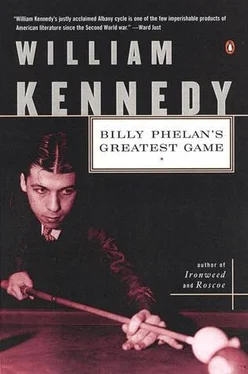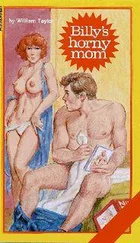Paper rustled behind him as he stood amid the clackety lullaby. He turned noiselessly to see a large, relaxed rat walking across the scatter of early editions and old wire copy left by the nightside on top of the copy desk. The rat stopped at a paste pot on the desk and nibbled at the hardened outer crust. The pot moved, the rat inched forward, and then, with dexterous forefeet, it lifted the dauber an inch and pushed its own nose into the center of the pot, into the cool, fresh, soft, sweet stickiness of the paste.
Breakfast.
Martin counted eighteen steps going out of the building and waved at Rory Walsh, the early man in the sports department, schoolboy football specialist coming out of Steve White’s twenty-four-hour bar. Old man Ridley stood in front of his newsroom, burning yesterday’s policy slips in the gutter. The window seats of the Capitol Hotel restaurant, reserved for T-U folk, were empty. Martin’s stomach rolled at the thought of the lobster tail special, three for fifty-five cents. He stopped at Green’s stationery store and bought wrapping paper, ribbon, and a card for the present he would give Melissa, tit for tat. The horseroom upstairs over Green’s was already open for business. Across the street, Keeler’s tempted, as always, and his stomach rolled again. He had slept badly and left the house without waking Mary, without eating. Should he indulge? He did.
Perhaps his decision was colored by his having eaten here in 1928 with Melissa, two breakfasts and one dinner in three days, the only times they left the hotel room, fortifying their bodies with what he considered the equal of the best food on earth, reconstituting themselves for the return to their bed of second-generation concubinage.
He now ordered eggs Benedict, hard rolls and salt sticks, iced butter, marmalade, hashed browns, steaming coffee in the silver pot. A grumpy Jewish waiter in black jacket and long white apron, shuffling on flat feet, served the meal impeccably. Two thirty-five with tip. Gorgeous. He felt stylish, and buoyed by nostalgia. Ready for the lady.
She was registered in a twelfth-floor suite, and he approached it along the carpeted hallway, certain he would rouse her from sleep. He knocked loudly four times before she opened the door, each rap an explosion in the silent corridor.
“I came for my gift,” he said.
“You fool. Why didn’t you call? Haven’t you any thought for a lady’s condition at such an hour?”
“Your condition looks fetchingly normal to me. Dressed for bed.”
“I must look wretched.”
She left the door open and crossed the suite’s sitting room, barefoot in a white calf-length negligee, and disappeared into the bedroom. Martin entered and the door swung closed. He put his hat on the coffee table and sat in the love seat. An etching of a step-gabled Dutch house hung on one wall, a Maxfield Parrish print on another wall— Daybreak , everybody’s favorite picture fifteen years ago. The naked nymph bent over the reclining beauty waking from sleep, the mountain lake and the trees of Arcadia framing the morning confrontation, the brightening sky dappling the mountains and lighting incipient joy. Beneath it on the sideboard Martin saw his father’s notebook. It lay flat, a ledger eighteen inches long with canvas and leather cover and binding, and bearing the India ink marking his father had made to identify it by date.
Here was a contrast of low and high art by master achievers: Parrish setting out to entrap popular taste, Edward Daugherty laboring with the death throes of his soul to produce a play that reflected his supreme independence of the crowd. The ledger contained the notation of the history of a masterpiece as well as the revelations of a notorious disgrace. Daybreak , with all its dynamic symmetry, made Martin want to throttle Parrish for foisting on the millions the notion that life was tidy, life was golden. Still, the hint of Lesbos had its place on any wall of Melissa’s suite, as Edward and Martin Daugherty both knew.
Looking at the ledger, it occurred to him to take it and leave. He had often mused on burglary as a means of retrieving it. He turned his eyes from it only because Melissa reentered the room in a baby blue satin robe and matching pompommed mules. She had brushed her silvering chestnut hair, colored the cream of her cheeks with a subtle touch of rouge, lifted her eyes from sleep with pale green eye shadow, and powdered away the gleam of her shining morning brow. Her beauty, though controlled by chemistry, was a miracle at forty-nine, given the terror of personal and professional oblivion with which she had lived most of the last decade. Even her wrinkles were now seemly, allowing her to relinquish at last that girlish beauty with which she had lived far too long, keeping her on the cover of Photoplay , but sabotaging all her efforts to become a serious actress. For who could believe an anguished spirit lurked behind a face as elegant and proud of itself as Melissa’s? No one could, until her role as the cloistered Marina (Katrina) of The Flaming Corsage forced a reappraisal of her talent by the critics: Here is a totally new Melissa Spencer. . acts as if born to the stage. . confounds critics who said her voice would fail in talkies. . most fully articulated female presence on the Broadway stage this year, etc.
She went straight to the telephone and ordered breakfast for two: cantaloupe, camembert, croissants, and champagne. Of course. Then she flounced into an armchair across from Martin, framed by Daybreak and a cut-glass vase full of white roses opening to the morning with the shining sublimity of their final blooming, only hours left in their life.
“Are you well?” she asked.
“I may be recuperating, but I’m not sure.”
“That sounds dreadful, as if you’re living in some awful sanitarium.”
“That’s not far off. I’ve been on a morose spiritual jag for years, and it’s worse these past few days.”
“Is it your father? How is he?”
“It’s that, but it’s not that simple. And he’s quite senile but otherwise healthy. It’s my son going off to the priesthood, and it’s a friend just kidnapped by hoodlums.”
“A kidnapping! How fascinating!”
“Oh, Christ, Melissa.”
“Well, isn’t it fascinating?”
“Everything isn’t fascinating. Some things are serious.”
“Oh, poo.”
“Tell me about you. I suspect you’re well. I read your notices.”
“It is rather a ducky time.”
“You look very fit. For anything.”
“Don’t be forward now, lovey. It’s much too early.”
“I’ve known you, my dear, to throw away the clock.”
“Me? Not me, Martin. You must be remembering one of your casual women.”
“I could’ve sworn it was you. That week the taboos came tumbling down. The Hampton, was it?”
“Don’t be awful now. Don’t. I get shivery about that. Tell me about the play. Did you like it?”
“You were quite splendid. But then you’re always quite splendid. And I did find that wig becoming.”
“Did I look like her to you? I did try.”
“At times. But she was never quite as sensually animated as you played her.”
“She must have had her moments.”
“I think,” said Martin, and he pictured his mother coming down the back stoop naked, walking past the small garbage pail, wearing only her sunbonnet hat and her white shoes and carrying her calico handbag, “that all she ever had was her repressions.” Walking into the waiting arms of Francis Phelan? Did they ever make love after that intimacy?
“So sad,” said Melissa.
“Very sad. But that’s not one of your problems, I’ve noticed.”
“Avoiding things never made any sense to me, none whatever.”
Читать дальше












